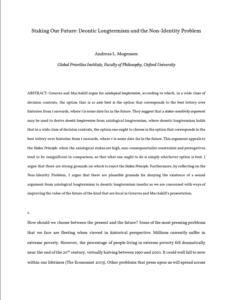Staking our future: deontic long-termism and the non-identity problem
Andreas Mogensen (Global Priorities Institute, Oxford University)
GPI Working Paper - No. 9-2019
Greaves and MacAskill argue for axiological longtermism, according to which, in a wide class of decision contexts, the option that is ex ante best is the option that corresponds to the best lottery over histories from t onwards, where t is some date far in the future. They suggest that a stakes-sensitivity argument may be used to derive deontic longtermism from axiological longtermism, where deontic longtermism holds that in a wide class of decision contexts, the option one ought to choose is the option that corresponds to the best lottery over histories from t onwards, where t is some date far in the future. This argument appeals to the Stakes Principle: when the axiological stakes are high, non-consequentialist constraints and prerogatives tend to be insignificant in comparison, so that what one ought to do is simply whichever option is best. I argue that there are strong grounds on which to reject the Stakes Principle. Furthermore, by reflecting on the Non-Identity Problem, I argue that there are plausible grounds for denying the existence of a sound argument from axiological longtermism to deontic longtermism insofar as we are concerned with ways of improving the value of the future of the kind that are focal in Greaves and MacAskill’s presentation.
Other papers
In Defence of Moderation – Jacob Barrett (Vanderbilt University)
A decision theory is fanatical if it says that, for any sure thing of getting some finite amount of value, it would always be better to almost certainly get nothing while having some tiny probability (no matter how small) of getting sufficiently more finite value. Fanaticism is extremely counterintuitive; common sense requires a more moderate view. However, a recent slew of arguments purport to vindicate it, claiming that moderate alternatives to fanaticism are sometimes similarly counterintuitive, face a powerful continuum argument…
‘The only ethical argument for positive 𝛿’? – Andreas Mogensen (Global Priorities Institute, Oxford University)
I consider whether a positive rate of pure intergenerational time preference is justifiable in terms of agent-relative moral reasons relating to partiality between generations, an idea I call discounting for kinship. I respond to Parfit’s objections to discounting for kinship, but then highlight a number of apparent limitations of this…
Doomsday and objective chance – Teruji Thomas (Global Priorities Institute, Oxford University)
Lewis’s Principal Principle says that one should usually align one’s credences with the known chances. In this paper I develop a version of the Principal Principle that deals well with some exceptional cases related to the distinction between metaphysical and epistemic modality. I explain how this principle gives a unified account of the Sleeping Beauty problem and chance-based principles of anthropic reasoning…

